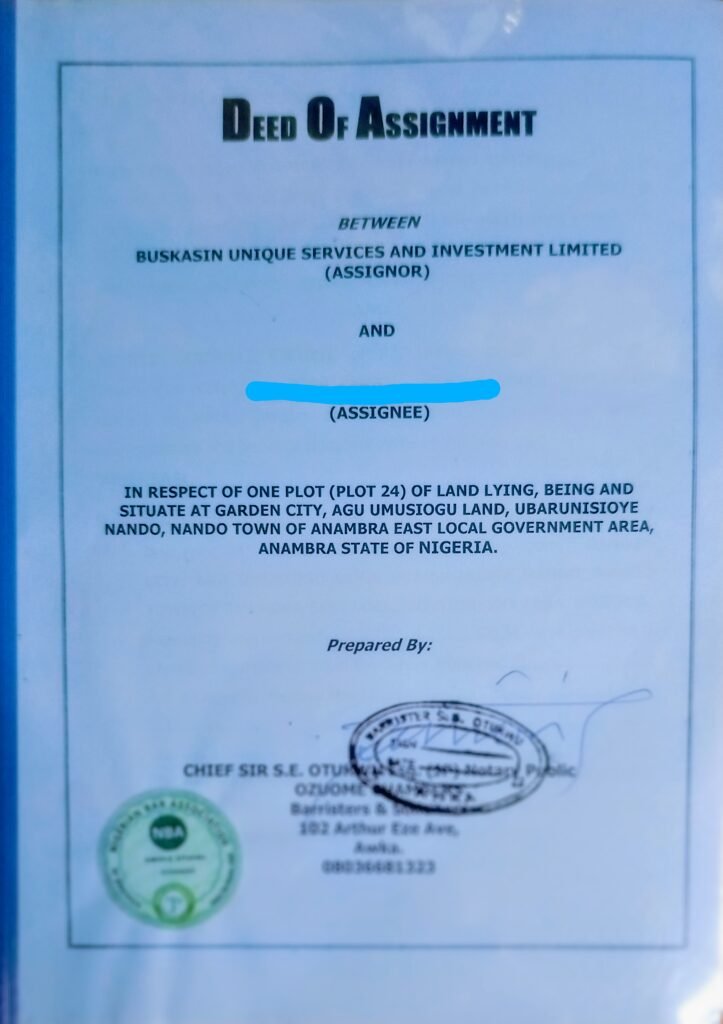A Deed of Assignment is an important legal document in real estate transactions, especially in Nigeria. It serves as proof of the transfer of ownership of a property from the seller (assignor) to the buyer (assignee). This document is essential for establishing the buyer’s legal rights to the property, protecting both parties involved. In this article, we will see the importance, and features of a Deed of Assignment, how to obtain one in Nigeria, and how to spot a fake Deed of Assignment.
Importance of a Deed of Assignment
- Legal Ownership: The Deed of Assignment is the primary document that legally transfers ownership of the property from the seller to the buyer. Without it, the buyer cannot claim legal ownership of the property.
- Proof of Transaction: It serves as concrete evidence of the transaction, detailing the terms and conditions under which the property was sold. This helps in resolving any disputes that may arise in the future.
- Protection of Rights: For the buyer, the Deed of Assignment ensures that their rights to the property are protected. It guarantees that the seller has the legal right to sell the property and that there are no undisclosed encumbrances.
- Required for Registration: The Deed of Assignment is necessary for the registration of the property with the land registry. Registration provides legal recognition of the buyer’s ownership and is crucial for any future transactions involving the property.
- Financial Security: For both parties, the Deed of Assignment outlines the financial terms of the transaction, including the purchase price and payment terms. This ensures transparency and prevents any misunderstandings related to financial matters.
See>>> Your Blueprint to Land Ownership: Nigerian Titles and Documents
Features of a Deed of Assignment
- Parties Involved: The Deed of Assignment must clearly state the names and addresses of the assignor (the seller) and the assignee (the buyer). These details are required to identify the parties involved in the transaction.
- Property Description: The document should include a detailed description of the property being transferred. This includes the location, size, and any specific features or boundaries of the property. Accurate and precise descriptions help prevent disputes over the property in the future.
- Recitals: The recitals section provides a background of the transaction, detailing the history of the property’s ownership. This section usually includes information about previous owners and how the property has changed hands over time.
- Consideration: This refers to the amount of money paid for the property. The Deed of Assignment should clearly state the agreed purchase price. This ensures transparency and helps establish the financial aspect of the transaction.
- Covenants: These are promises made by the assignor and the assignee. Common covenants include the assignor guaranteeing that they have the legal right to sell the property and that there are no undisclosed encumbrances on the property. The assignee may covenant to adhere to any specific terms of the property’s use.
- Execution: Both parties must sign the Deed of Assignment, and independent parties should witness their signatures. This step is critical to validate the document. In some cases, the deed may also need to be notarized.
- Stamp Duty and Registration: The document should be stamped and registered at the appropriate land registry. This step is important for legally recognising the property transfer and making the document enforceable.
See>>> Questions to Ask When Buying Land in Nigeria

How To Obtain a Deed of Assignment in Nigeria

- Hire a Lawyer: The first step is to hire a qualified real estate lawyer. A lawyer will provide legal advice, draft the Deed of Assignment, and ensure that all legal requirements are met. If you buy from a real estate company, the real estate company will handle the preparation of the Deed of Assignment, as they have in-house lawyers.
- Conduct a Property Search: Before drafting the deed, it is essential to conduct a search at the land registry to confirm the property’s ownership and check for any encumbrances. This step helps ensure that the assignor has the legal right to sell the property.
- Negotiate Terms: The assignor and assignee must agree on the terms of the property transfer, including the purchase price, payment schedule, and any specific conditions.
- Draft the Deed: The lawyer will draft the Deed of Assignment, incorporating all agreed terms and legal requirements. This draft should be reviewed by both parties to ensure accuracy and mutual agreement.
- Execution and Witnessing: Both parties must sign the deed in the presence of witnesses. The witnesses should also sign the document, providing their names and addresses.
- Stamp Duty Payment: The document must be stamped at the Federal Inland Revenue Service (FIRS) or the relevant state tax office. Stamp duty is a tax paid on legal documents to make them legally binding.
- Registration: The final step is to register the Deed of Assignment at the appropriate land registry. Registration ensures that the transaction is recorded in the government’s official records, providing legal proof of ownership.
See>>> Understanding Certificate of Occupancy (C of O) and Its Types
How to Spot a Fake Deed of Assignment
- Verify the Seller’s Identity: Ensure that the assignor’s identity matches the details in the deed. Request and verify their identification documents, such as a national ID card, international passport, or driver’s license.
- Check Property Description: The property description in the deed should be detailed and accurate. Compare it with the actual property and any survey plans. Inaccurate or vague descriptions can be a red flag.
- Conduct a Land Registry Search: Perform a search at the land registry to verify the ownership history and check for any encumbrances. A genuine Deed of Assignment should align with the records at the registry.
- Review the Stamp Duty: Ensure that the document has been stamped by the appropriate authority. Check for the official stamp duty receipt and verify its authenticity with the issuing authority.
- Witness Signatures: Verify the identities of the witnesses who signed the document. They should be independent parties who can attest to the execution of the deed.
- Lawyer’s Involvement: Engage a qualified lawyer to review the Deed of Assignment. A lawyer can identify any irregularities and ensure that the document complies with legal standards.
- Cross-check Covenants: Ensure that the covenants stated in the deed are clear and make sense. Ambiguous or overly complex covenants might indicate an attempt to obscure fraudulent details.
- Physical Inspection: Visit the property and compare its details with those described in the Deed of Assignment. This includes checking the boundaries, landmarks, and any structures on the property.
Finally, a Deed of Assignment is a vital document in real estate transactions, serving as proof of property ownership transfer. Understanding its features, how to obtain one, and how to spot a fake is necessary for anyone involved in buying or selling property in Nigeria. By following these guidelines, you can protect yourself from potential fraud and ensure a smooth property transaction.
FAQ
What is the meaning of Deed of Assignment?
A Deed of Assignment is a legal document used in real estate transactions to transfer ownership of a property from the seller (assignor) to the buyer (assignee). It serves as proof of the transaction and outlines the terms and conditions of the transfer, including the property description, consideration (purchase price), and any covenants made by both parties.
Who prepares the Deed of Assignment?
The Deed of Assignment is typically prepared by a qualified real estate lawyer. If you buy property from a real estate company, the company will usually handle the preparation of the deed, as they have in-house lawyers who draft and manage these documents.
What is the difference between a Land Agreement and a Deed of Assignment?
In simple terms, a Contract of Sale is the document signed before purchasing a property, outlining the terms and conditions of the sale. It serves as an agreement between the buyer and seller.
A Deed of Assignment is the document signed after the buyer has fully paid for the property. It legally transfers ownership from the seller to the buyer and must often be registered to be legally binding.
How to Register a Deed of Assignment in Nigeria?
- Prepare the Deed: Ensure that the Deed of Assignment is properly drafted and signed by both parties, with witness signatures.
- Stamp Duty Payment: Pay the stamp duty to the Federal Inland Revenue Service (FIRS) or the relevant state tax office. Obtain the stamp duty receipt.
- Visit the Land Registry: Take the stamped Deed of Assignment to the appropriate land registry office where the property is located.
- Submit Required Documents: Provide the Deed of Assignment, proof of stamp duty payment, identification documents, and any other required documents.
- Complete Registration: The land registry will process the registration and record the transaction in their official records. You will receive a registered copy of the Deed of Assignment.
What is the difference between a Power of Attorney and Deed of Assignment?
- Power of Attorney: A legal document that authorizes one person to act on behalf of another in legal or financial matters. It is often used to manage property or sign documents.
- Deed of Assignment: A document used to transfer property ownership or an interest in a property from one party to another. It is a formal record of the property transfer.
How much does a Deed of Assignment cost in Nigeria?
The cost of a Deed of Assignment in Nigeria varies based on several factors, including the property’s value and the fees charged by the lawyer or real estate company preparing the document. Additionally, there are costs for stamp duty, which is a percentage of the property’s value or purchase price. It’s advisable to consult with a real estate lawyer for a detailed cost estimate.
Is Deed of Assignment the same as C of O?
No, a Deed of Assignment and a Certificate of Occupancy (C of O) are not the same. A Deed of Assignment is a document that transfers ownership or interest in a property from one person to another. A Certificate of Occupancy is an official government document that provides proof of land ownership and usage rights.
What makes a Deed valid in Nigeria?
For a Deed to be valid in Nigeria, it must meet the following criteria:
- Proper Parties: Clearly identify the grantor and grantee with legal capacity.
- Legal Interest: The grantor must have the authority to transfer the property.
- Consideration: Something of value must be exchanged.
- Clear Description: Accurately describe the property.
- Intention to Transfer: Clearly state the intention to transfer ownership.
- Execution: Signed by the parties and witnessed by at least one person.
